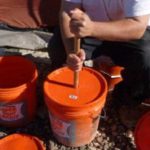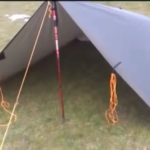How Bad Will a Food Shortage Really Get in America?
We have one of the most sophisticated and efficient food distribution systems in the world. In fact, the vast majority of food that we get at the local grocery store comes from far away places. We don’t have warehouses full of supplies, we don’t have staples stored in silos for emergency reserves, and we don’t have access to back up plans if the SHTF. What does this mean for America if we encounter a disruption to food supplies?
Fragility of the System

The first thing to realize is that our food distribution system is very fragile to begin with. Between relying on fuel, trucks, good roads and sophisticated computer networks to get products from the farm to the table, we are vulnerable at many points along the supply chain. Couple that with the fact that a range of natural and man-made problems can eliminate supplies at the source as well. Massive bird flu outbreaks can kill off entire chicken farms. Mad cow disease can decimate the beef industry. Drought or insect infestations can pummel crops.
There are million and one different scenarios that can impact food supplies on their own, but the threat is magnified exponentially if two or more scenarios collide at the same time. Couple that with crazy weather occurring in different parts of the world that impact food imports and exports, and it’s easy to see how quickly things can go from normal to chaotic.
Mass Die-offs
We can expect to see mass die-offs of the human population within weeks of a major distribution interruption. Do you really think that the government has the capability to bring food to every corner of the country following a SHTF situation such as an EMP or massive attack on our power grid? Do you think that people will sit idly by and wait for supplies to arrive without resorting to violence and desperate measures to get food? People will die. Access to food supplies will be limited, and the government as well as corporate interests will be the ones that decide who gets to eat. This is the reality that we must accept, and chances are that those who do get access to food will not be your average American.
Stockpiles are Only Marginally Safe

Consider the amount of time and energy that you’ve put into building your stockpile. You have a great collection of survival food items in your basement, shelter or bug out location. However, how safe do you really think those supplies are if you are suddenly swarmed with raiders, looters, government officials or anyone else who is hungry and scared enough to do anything to get their next meal. Your stockpile may be worth its weight in gold and represent a priceless currency during a SHTF scenario.
What are you doing to protect it? What are you doing to protect your family? Unfortunately, there’s only so much that we can do in all reality. We need to accept this and think of ways to diversify so that if one of our sources is compromised, we don’t lose the entire stockpile. Yet, stockpile security is often the last thing that people think about as they prepare for SHTF.
Keep in mind that a food shortage can turn into a global crisis in the blink of an eye. If our distribution systems and food supplies get jeopardized, it’s not beyond the realm of possibility that we will either try and take it from other countries or end up giving up a lot of our sovereignty or spending a lot of money in order to get help from the international community. Let your mind dwell on the ramifications of that, and it doesn’t take a lot of imagination to see how the entire geopolitical landscape can change in the blink of an eye.
Today, Americans by and large are well-fed and have access to the best food that the world has to offer. However, that may not be the case tomorrow. How prepared are you to face such a contingency? Remember that the most self-sufficient will be the ones who stand the chance of faring the best. Those who have land and the ability to grow and generate their own food will be in a much better position than those who have good stockpiles.
However, even those people are at risk of losing everything from a raid. The bottom line is that we need to find multiple layers of food security in order to weather storms that can come with little or no warning. A serious food emergency can unfold in a matter of days, and millions of people can die. Do everything that you can to avoid being one of them.














